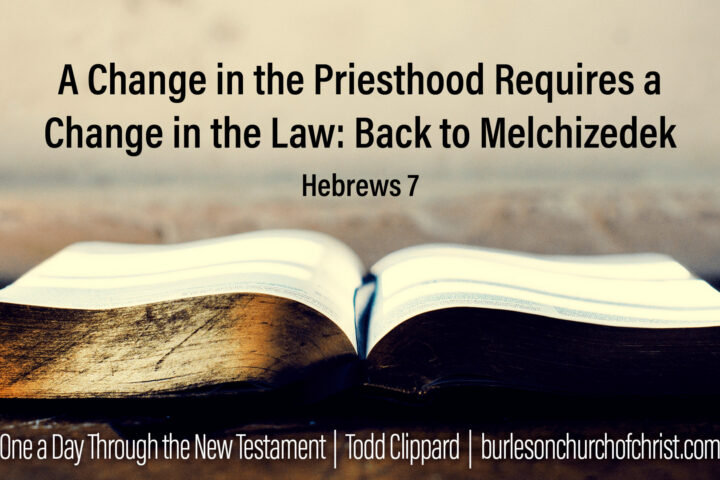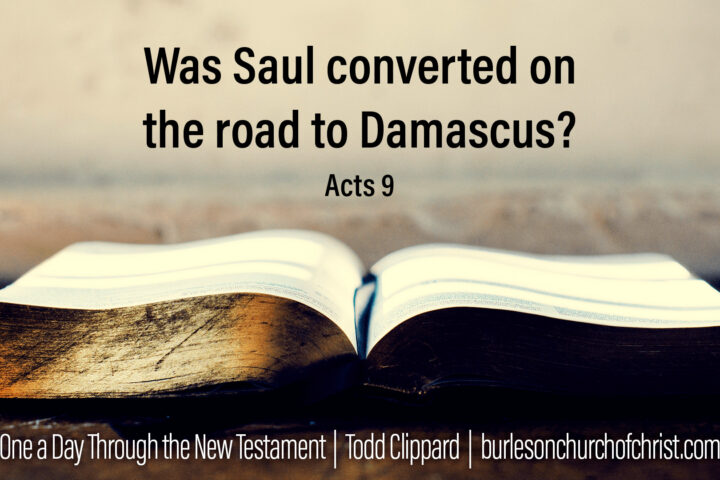Posts from May 2020
Acts 18: Don’t kick a man when he’s down
Today’s blog title is a well-known adage that doesn’t get much “play” in modern society. Kicking a person when he’s down is standard operating procedure today. The Jews in today’s reading would have done well to observe this practice (or non-practice), as it may have led one of their own to be more willing to leave their fold. In Acts 18 we read of the conversion of Crispus, who served as the ruler of the synagogue in Corinth (v 8).…
Acts 17: To the Unknown God, a.k.a., Covering Your Bases
A local preacher friend told a story some years back, and I believe it was told as a personal account, of encountering a man one day who requested to be baptized. This sort of request doesn’t happen often, so the preacher made inquiry as to the reason for the blunt request. The man responded that he had been reading his Bible and believed he needed to be baptized in order to be saved. However, not knowing which baptism was the…
Acts 16: How did God open Lydia’s heart?
One of the most well-known statements in Acts 16 and the conversion of Lydia and her household. In verse 14, the text says, “The Lord opened her heart to heed the things spoken by Paul.” Lydia is the only hearer mentioned in the text as having her heart opened, yet all the women present are spoken of as being baptized following the teaching of Paul. Question: did the Lord operate directly on Lydia’s heart, or did He use means, that…
Acts 15: We shall be saved in the same manner as they
In Acts 15 we find the first real doctrinal threat to the young and thriving church. Many of the leading Jews, including some converts among the Pharisees, were not content with God’s simple plan to save. Instead, they sought to bring in some of the Old Law as a means of exercising some control over the new Gentile converts. Such men are commonly called “Judaizers.” Unconvinced by the arguments of Paul and Barnabas, the brethren sent them to Jerusalem to have…
Acts 14: He had faith to be healed
Perhaps the most heartless and unbiblical fraud perpetrated by so-called faith healers is the claim that, after they fail, the subject of their intent had insufficient faith to be healed. Never mind that the individual made a special trip, made a specific request, and exhibited a genuine belief in the so-called man of God to provide healing. Nope. It was all the fault of the sick or disabled person. Without question or fail, these failed healers will point to an…
Acts 13: With great power comes great responsibility
This is perhaps the most famous line from Stan Lee’s Spiderman, spoken by Uncle Ben. It is attributed originally to Voltaire in the 18th century. (One might say Jesus said it first in Luke 12:47-48). Acts 13 records the inaugural missionary journey of Barnabas and Saul. At their first stop, we see what might be described as an abuse of power on the part of Saul. As he and Barnabas made their way across Cyprus, they encountered an honest soul…
Acts 12: Because he did not give glory to God
This was the explanation of Herod’s condemnation and death. Accepting the false accolades of men as if he were God, the one true God struck him, “and he was eaten by worms and died” (v 23). What a horrible end of life for a failure to do what should be so obvious! I wonder if sometimes we might be in danger of failing to give glory to God. Most of us find it easy to glorify God in good times,…
Acts 11: The disciples were called Christians first in Antioch.
The name “Christian” appears for the first time in today’s reading and only two other times in the New Testament. Agrippa spoke of being almost persuaded to be a Christian in Acts 26:28. Peter used the term in 1 Peter 4:16, “If anyone suffer as a Christian, let him not be ashamed, but rather let him glorify God in this name” (ESV). Some commentators believe the name Christian was given in contempt by the Jews (JF&B). Others disregard this theory…
Acts 10: Cornelius’ household and the baptism of the Holy Spirit
The book of Acts is a history of the establishment and life of the early church. It is also a record of the first conversion accounts. Several of our studies in recent days have centered on the matter of baptism. Today’s blog continues this line of study but will be the last for a while, as the text moves on from specific conversion accounts to the work of Peter and Paul. There are only two recorded incidents of the pouring…
Acts 9: Was Saul converted on the road to Damascus?
One of the most common errors taught concerning Saul of Tarsus is that he was converted and saved on the road to Damascus. The singular defense of this doctrine is Ananias’ use of the word “brother” (“adelphos”) in addressing Saul in verse 17. Among the commentators so claiming include Adam Clarke, JFB, A.T. Robertson, Vincent, Albert Barnes, Matthew Henry, Schaff, and Wycliffe. Adelphos appears more than 340 times in the New Testament. Of the numerous commentaries I researched, only the…









